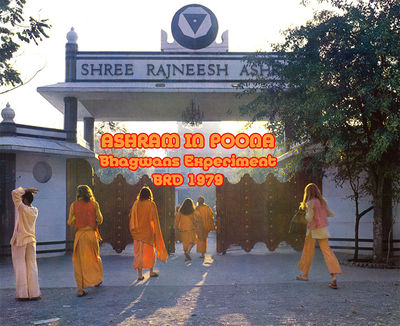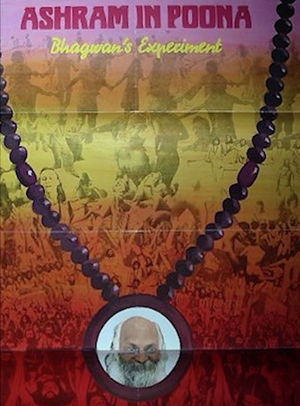Ashram in Poona - Bhagwans Experiment (1979)

- In 1978 the German film maker Wolfgang Dobrowolny (Sw Veet Artho) visited the Ashram in Poona and created a unique documentary about Osho, sannyas and the ashram.
- He was the first (and only) film maker ever to be permitted to film inside the legendary encounter groups.
- These pictures shocked the west. Scenes like these had never been seen before: screaming naked men and women, rolling all over each other in a small room full of mattresses.
- The scenes in the encounter group were filmed with people who had experienced the group before and participated voluntarily. The filming was certainly not done in secret (as is sometimes claimed, e.g. on IMDB). (Filming in secret would be physically impossible in that room.) See also the quote of #Krishna Prem on this film.
- Description from Osho Film Festival :
- This film is an absolutely unique historical document
- In 1978 a German film maker visited the Ashram in Poona and created a unique film document about Osho, his Sannyasins and the ashram.
- He was the first and only film maker whom Osho ever permitted to film inside the legendary encounter groups.
- These pictures shocked the west.
- Scenes like this had never been seen before: screaming naked men and women, fighting with each in other in a clumsy little room full of mattresses.
- The prudish imagination of middle class couch potatoes went wild.
- Significant numbers of celebrities had been visiting this exotic place in India and the tabloids had already labelled Osho as the “Sex-Guru” but nobody had ever seen what was really happening there.
- This documentary created an outburst of emotion in the late 1970s and went deep into the common unconsciousness of western societies.
- Even though it was the basis of the fanatic condemnation of Osho in the west, it also lead thousands of interested young people to Poona.
- This film dominates public discussion to this day about Osho, spiritual search and group therapy.
- It is an absolutely unique historical document.
- language
- English, German
- released
- 1979 (USA: 1981)
- length
- 1 h 35 min
credits
- director
- Wolfgang Dobrowolny
- written by
- Wolfgang Dobrowolny
- Wilhelm Schulz
- Peter Clausen
- Freidemann Kliesch
- Kirsten Liesenborghs
- produced by
- Helmut Dobrowolny
- Wolfgang Dobrowolny
- Michael Fengler
- music by
- Jacky Carter
- Georg Deuter
- Klaus Schulze
- cinematography by
- Peter Claussen
- Wolfgang Dobrowolny
see also
- OshoViha
- Ashram in Poona on IMDB
- Ashram, The Movie a review on Osho News
- A Letter to Christopher Hitchens on Osho News
- Osho Film Festival
- LIFE AT AN ASHRAM, SEARCH FOR INNER PEACE The New York Times, Nov. 13, 1981
- OshoFilmArchive catalog no : OFA00,002
film
- View on Dotsub.com. This has slightly different content from other versions, and no English voice-over.
- This version has apparently been taken down.
- A clip from this film on YouTube: the interview with Sw Satyananda Jörg Andrees Elten, with English subs
- Swami Satyananda (Jörg Andrees Elten) Sein O-Ton aus dem Kino-Klassiker "Ashram in Poona" (1979, Regie: Wolfgang Dobrowolny) Zunächst schrieb Elten für den STERN eine Reportage über den Bhagwan Shree Rajneesh Ashram und schuf dann später den Bestseller: "Ganz entspannt im Hier und Jetzt".
- Hier reflektiert Satyananda Oshos Sichtweise und eigene Historie. (English subtitles by Nirguna - press CC or icon)
- See also: Der Spiegel 2012#22 - Im Bann des Weisbarts - 85913023.pdf
Krishna Prem on this film
Here is a quote from Krishna Prem's book Osho, India and Me, p.310. They are talking about the visiting Christopher Hitchens (see also here), who has said something about the BBC acquiring film material of this film :
- “What he writes doesn’t worry me as much as that bit he dropped about Veet Artho selling the BBC some of his footage, I reply. That mock encounter group Laxmi had set up for Veet Artho and his German crew to film is still, for me, one of her major booboos.
- The subject’s been unbroachable ever since and so, since she’s in Delhi, I take my concern to one of her secretaries.
- I'll get onto the BBC and tell them Veet Artho’s broken his contract with us --which he has, the schmuck-- and let them know he’s got no right to sell them anything, that the film legally belongs to us,” she says. “Don’t worry. I’ll handle it.”
And a quote from KP's letter to Christopher Hitchens :
- Next, you talk about the film by Wolfgang Dobrowolny –or Veet Artho as we knew him– that was shot in “secret.“ More invention on your part. Laxmi, Osho’s secretary and the Foundation’s managing trustee, fell for Veet Artho’s sweet talk and, despite repeated and vociferous warnings from me and others that it would come back to haunt us, gave him permission to shoot footage of an encounter group in which physical expression was allowed – an initiative of encounter group leader Teertha which Osho immediately instructed be dropped as soon as someone got hurt.
- Laxmi’s mandate was, as she put it, that “word (of Osho’s availability in Pune) must reach all the corners of the world,“ and in her naivety (she’d never been outside India) she thought people would see how liberating it was to free themselves from repressed emotions and traumas and flock to Pune. It came as a shock to her to learn that the majority of people back in the 1970s, when faced with a reflux of suppressed emotion or childhood pain chose, rather than dealing with it, to have another fag and pour another couple of stiff drinks.
- By the way, Dobrowolny never owned the rights to the film. They were retained by the Foundation, and the BBC’s use of the footage was illegal.

